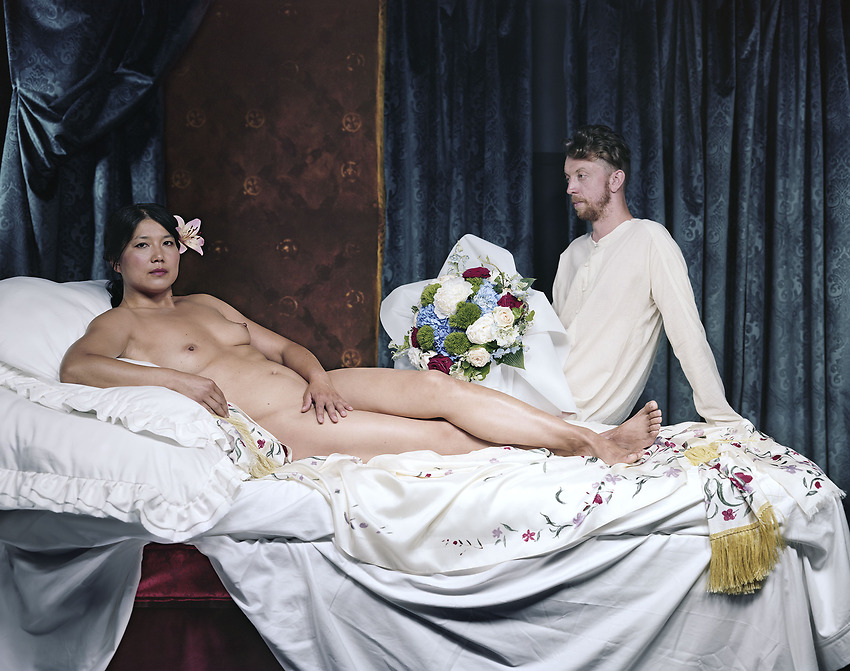
Yan Wang Preston: Three Easier Pieces. New solo exhibition at Messums London. 24 April-25 May 2024.
Full Press Release.
To know more about the exhibition and the print sales, visit Messums.Org.
In her second solo exhibition at Messums London, the Chinese-British photographer Yan Wang Preston presents new works that explore the complexities of cultural migration by restaging iconic artworks in different geopolitical and cultural contexts. The series includes the photographic and performative restaging of artworks such as ‘To Add a Metre to an Anonymous Mountain, 1995’, ‘Wanderer above the Sea of Fog, 1817’, and ‘Olympia,1863’, the latter featuring the first decolonial study of the botanical details in Manet’s painting. Already three years in the making, Three Easier Pieces is the debut appearance of the works. The exhibition will feature a selection of large, collectable prints as well as a ‘Making Room’ sharing behind the scenes materials such as letters for volunteers, snapshots, and films.
The first piece in the series, After ‘To Add a Metre to an Anonymous Mountain, 1995’ was made in August 2021. The original work saw ten young Chinese artists piling their naked bodies on top of each other in the suburb of Beijing as a solidary protest against the societal expulsion that they suffered. Facing the ever-present gender, cultural and racial segregations within our societies, Wang Preston decided to restage the work by deliberately inviting people from diverse backgrounds. Nine local volunteers performed with her, nakedly, with skin-to-skin contact. Together they formed a new conglomerate body on a post-industrial moorland in Lancashire, UK. In doing so, she not only re-considers traditionally influential artworks from the lens of eco-feminism and interculturalism, but also celebrates Britain’s multicultural society with its politically aware citizens, suggesting a possible future when integration and empathy transcend boundaries between peoples, cultures, and countries.
Wang Preston continues her exploration in landscape representation, gender, the gaze, and western colonialism in the next work. Caspar David Friedrich’s Wanderer above the Sea of Fog (1817) was selected for its highly problematic iconisation of (western) men. In order to disrupt and de-centralise, Wang Preston, together with friends, performed the painting nude, standing on a rock forming a comparable composition for as long as they could endure. She describes, “It scrutinised our exposed bodies mercilessly while sharing our vulnerabilities with the viewers. Such discomfort continues when I face so many reclining female nudes in western history of art.”
The third work in the series restages of Manet’s Olympia (1863). To overturn the painting’s hidden power hierarchy, Wang Preston first replaced the white prostitute with a white man. She then took the place of the prostitute herself as a non-white woman and a performing photographer, not to endure, but to return the gaze. Further studies explored the details of the painting, including the splendid bouquet, and subsequently identified the main flower as a white peony. Such discovery further places Manet’s modernity within western colonialism due to the introduction of peonies to the UK from China in the eighteenth century. A ‘pictorial reclaim’ of such botanical origin is suggested with three black and white photographs, re-visualising Manet’s bouquet with traditional Chinese flower and bird painting aesthetics.
Wang Preston comments, “One needs a community to make change. All three pieces were made with multi-ethnic volunteers who were fully aware of the works’ critical intentions. To re-photograph is to have a conversation with history. To re-stage with such naked bodies is to have an intimate, personal, and transcultural encounter with history. With this extreme sense of vulnerability, dis-placement and re-placement, a set of new understandings towards the past, the present and the self may emerge. This is what Three Easier Pieces are finding out.”